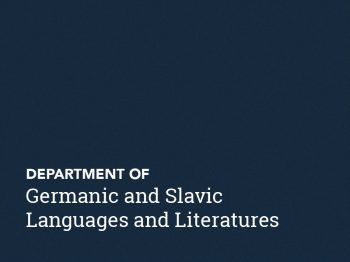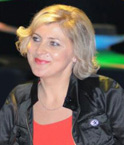News
Featuring a story about our visiting Ukrainian Fulbright Scholars: https://www.psu.edu/news/liberal-arts/story/ukrainian-fulbright-scholars-spending-year-college-liberal-arts


Four senior Russian majors — Aidan Dlugacz, Gabe Daubert, Veronika Miskowiec, and Logan Romanowski — and three Penn State faculty members — Yuliya Ladygina, Irina Mikaelian, and Catherine Wanner — attended the international conference and school Crisis of Democracy: Mutual Symmetrical Recognition Between States and Equal Distribution of Power, held September 13–20 at Shota Meskhia Zugdidi State University in Georgia. The event was co-sponsored by Tbilisi State University and the University of Warsaw, Poland.
The four-day conference was followed by a two-day school for graduate and senior undergraduate students from the University of Warsaw and Penn State. The school was led by Professor Agnieszka Nogal (University of Warsaw) and the Penn State professors, resulting in two joint student presentations.
Our students and faculty were generously hosted by Zugdidi State University. Irina Mikaelian and Catherine Wanner received titles of Doctor Honoris Causa from this university in recognition of their contributions to collaboration between our universities.
Zugdidi is the capital of the Georgian province of Mingrelia, a strategic region located on the border with Abkhazia, a former autonomous republic of Georgia currently occupied by Russia. Our students had the opportunity to explore the city of Zugdidi, the Black Sea coast, and the adjacent mountainous region of Svaneti, as well as to engage extensively with local faculty and residents, many of whom still speak Russian.
We are grateful to Shota Meskhia Zugdidi State University and its Rector, Teona Khupenia for their hospitality, as well as to the Penn State Liberal Arts Career Enrichment Office, which sponsored our students’ airfare.

Penn State’s German Studies program made a dynamic and wide-ranging contribution to this year’s German Studies Association conference, held in late September in Arlington, Virginia. Four faculty, seven current graduate students, and five alumni presented their research on various topics. From close readings of Adalbert Stifter, Peter Weiss, and contemporary graphic novels to corpus-assisted analyses of German press coverage, the work showcased the department’s interdisciplinary strengths and commitment to ethical inquiry.
Mike Mclaughlin presented on Sacha Hommer’s comic, Insekt, in order to interrogate the boundaries of being human through the hybrid use of textual language, visual form, and insect-based reimaginings of historical events.
Svetlana Myagkova took part in the annual Emerging Scholars Workshop on Migration in/and German Studies. Each day was dedicated to one of the key components of an academic career: research, teaching, and professional service.
Suchitra Harnahalli presented her paper, Rehearsals of Disruptions: Staging Störungen in Marat/Sade (Peter Weiss) on a panel about disruptions as both subject matter and narrative strategy. By reading Marat/Sade, through the lens of Plato’s allegory of the cave, she explored the play as a medium of a unsettling, “maddening,” and politically generative revolution.
Jack DiMidio took part in a panel on serial criminality in German literature and culture. He read Heinrich von Kleist’s Michael Kohlhaas alongside Hegel’s ethics to show how terrible crimes can sometimes positively affect ethical relations.
Gideon Kiptoo’s lecture deployed a discourse analytical approach to uncover the macro-strategies employed by the German regional and national press when reporting about the contentious topic of homosexuality in Kenya.
Wilson Xu’s presentation focused on the role of forgiveness and contemplation in Adalbert Stifter’s Granit as a part of the “Austrian Bodies and Families” panel.
Jenny Wilson joined the “Leben & Lebensphilosophie: A New Look” seminar which workshopped papers on the topic relating to Leben/Life as a distinct question that emerged with Naturphilosophie around 1800 and crescendoed around 1900. Like so many of the Penn Staters, Jenny enjoyed meeting and learning from the members in this workshop as well as supporting her fellow Penn State colleagues by sitting in on their wonderful and thought-provoking panels.
Samuel Frederick offered his new research on the Expressionist poems of the German-Jewish philosopher Hedwig Caspari.
Bettina Brandt took part in the GSA seminar “Wandering Artefacts: Dispersion, Digitization, and Multilingualism of German-Jewish Archives”, where scholars and archivists from Germany and the USA shared new archival findings, discussed research methods and debated how to further access to archives today.
Daniel Purdy continued his research into Asian-German relations by presenting a paper on Enlightenment race theory and the military incursion of Mongolian nomads into East Prussia. He was also met with enthusiastic applause from a dozen Penn State colleagues as he was awarded the Goethe Society’s Essay Prize.
This moment captured the spirit of the department’s presence at GSA: rigorous, supportive, and deeply engaged. Whether presenting revised seminar papers or attending one another’s panels, together, these experiences embody the ethos of the department: supportive and innovative scholarship.


For the last 30 years, scholars have treated Enlightenment race theory and nineteenth-century German colonialism as two distinct events. In Colonialism and Enlightenment, editors Bettina Brandt and Daniel L. Purdy present perspectives from scholars across the fields of philosophy, postcolonialism, literature, and German and African American studies, who challenge this view, providing a critical examination of the historical connection between “scientific” racial theory in late-Enlightenment Germany and the forces of colonialism and Nazism over a hundred years later.
From its first formulations in the eighteenth century and well into the twentieth century, German race theory was implicated in colonialism. Philosophers and biologists drew their arguments about race from information that was generated by the slave trade and plantation economies in the Americas. Their reliance on colonial data was applied to so-called “internal colonization” within Eastern Europe and Central Asia, as well as to seaborn European competition in South Asia. Most strikingly, some of the sites of German race theorization, such as East Prussia and the Baltic states, were themselves long-established colonies with ethnic separations between ruling and laboring populations. Race theory depended not only on the exploration of distant islands in the Pacific, but on the long-term exploitation and breeding of forcefully transported populations across the Atlantic. Without the involuntary migration of Africans, nineteenth century racial scientists would not have been able to engage in arguments about crossbreeding, skull size, and skin color.
The chapters in this volume explore how eighteenth-century German theories about race reinforced discourses on colonial settlements, both within and outside Europe. Given the multiple, often contradictory positions developed in the Enlightenment, Brandt and Purdy explore how later race thinkers responded to earlier concepts. How did Enlightenment-era debates figure into later forms of racism? How did nationalist and Nazi racisms view Enlightenment anthropology? What Enlightenment concepts and configurations persisted into the twentieth century? Taking a broad view, the scholars in this volume offer a variety of positions on these and other questions as they take stock of the debates about race and the Enlightenment held over the last 20 years.


UNIVERSITY PARK, Pa. – The Penn State Department of German and Slavic Languages and Literatures (GSLL) is pleased to welcome two Ukrainian scholars joining who are joining the department for 2025-26 via the Fulbright Scholars Program.

Mariia Grytsenko, assistant professor of translation at the Institute of Philology, Taras Shevchenko National University of Kyiv, will co-teach the introductory Ukrainian language sequence and assist in the enhancement of its curriculum during her two-semester stay. She will also assist with the further development of UKR 100 Ukrainian Culture and Civilization, thereby enriching the department’s broader offerings in Slavic, East European, and Eurasian studies. Beyond her academic responsibilities, Grytsenko will co-advise the Ukrainian Student Society and play a vital role in planning and coordinating a variety of extracurricular and outreach initiatives.
Grytsenko specializes in English–Ukrainian and Ukrainian–English translation and regularly teaches courses that integrate theoretical approaches with applied practice in the field of translation studies. She received her Ph.D. in translation studies from Taras Shevchenko National University in 2017.
Grytsenko is the co-author of three textbooks and has written multiple articles on translation and interpreting. She also has extensive professional experience as an interpreter, having collaborated with major international cultural institutions such as the DocuDays UA International Human Rights Documentary Film Festival and the Odessa International Film Festival.

Oleksandr Gon is a professor of translation at the Institute of International Relations, Taras Shevchenko National University of Kyiv. The title of his Fulbright Visiting Scholar project is “Ezra Pound and Yurii Klen: Contexts of Two Modern Unfinished Epics,” which examines Pound’s “The Cantos” (1917–1968) and Klen’s “Popil imperii” (The Ashes of Empires, 1943–1947). Building on his earlier work, Gon argues that while both texts reveal structural affinities in artistic vision and idiom, they diverge in poetics and ideology—Klen’s post-Romantic teleology contrasts with Pound’s cyclical and mythological method. Framing this as a poetic “ver(s)ification of history,” Gon highlights how modernist long poems reimagine the relationship between lyric subjectivity and epic tradition and offers fresh insight into transatlantic exchanges in 20th-century literature.
Gon earned his PhD in Philology from the Institute of Literature, National Academy of Sciences of Ukraine, in 2018. His scholarly interests include comparative literature, translation politics, and the intermedial study of narrative in both fiction and music. He has co-authored five textbooks on English–Ukrainian translation and is the author of two monographs: “Swinburne’s Poetry in the Context of Fin de Siècle” (1996) and “Paradigmatics of the Lyric and Epic in Ezra Pound’s Cantos” (2017).

Above is an article concerning a recent trip abroad to Armenia undertaken by Penn State students.

We are lucky enough to get to announce to all of you that Professor Adrian Wanner has been named Distinguished Professor of Slavic Languages and Comparative Literature. This is one of the highest academic honors at Penn State and most well-deserved.


Three scholars from Ukraine will join the department as non-residential scholars in 2025 thanks to an innovative fellowship program started at Indiana University in 2022 that has now expanded to nine Big Ten universities. With support from the Big Ten Academic Alliance, the fellowship provides a stipend to scholars who for professional, legal or personal reasons needed to stay in wartime Ukraine. In enables them to continue their research and teaching despite Russia’s invasion by giving them access to Library resources and allowing them to collaborate with US colleagues in research, teaching and publishing.
After Indiana University, Penn State is sponsoring the second greatest number of scholars of all Big Ten institutions at seven (from a total of 35). Three of these scholars will be housed in our department. They will give at least one online lecture per semester, participate in a bimonthly seminar, and an online conference. Their PSU faculty liaisons are Yuliya Ladygina, Yelena Zotova, and Adrian Wanner.
Oksana Pukhonska, an Associate Professor at The National University of Ostroh Academy whose research focuses on contemporary literature, memory and trauma studies, will investigate inherited traumatic memory in film and literary texts of the Ukrainian diaspora. Filmmaker Lesya Kalynska, the director of the award-winning 2022 documentary A Rising Fury shown at Penn State in Fall 2023, will be working on a new docuseries provisionally titled Before the Dawn (or Voices of Resilience in Ukrainian). Oleksandr Zaitsev, a Professor of History at the Ukrainian Catholic University in Lviv, will explore the relationship between Ukrainian nationalism and German National Socialism from 1930 to 1939.
|
|
|
|



